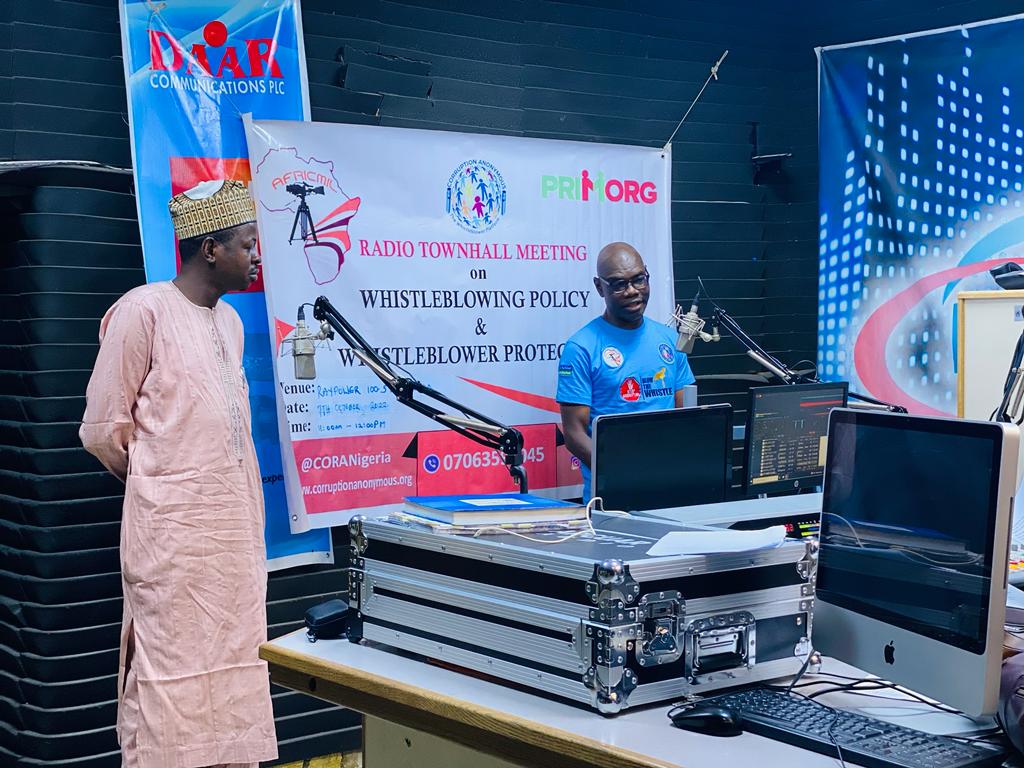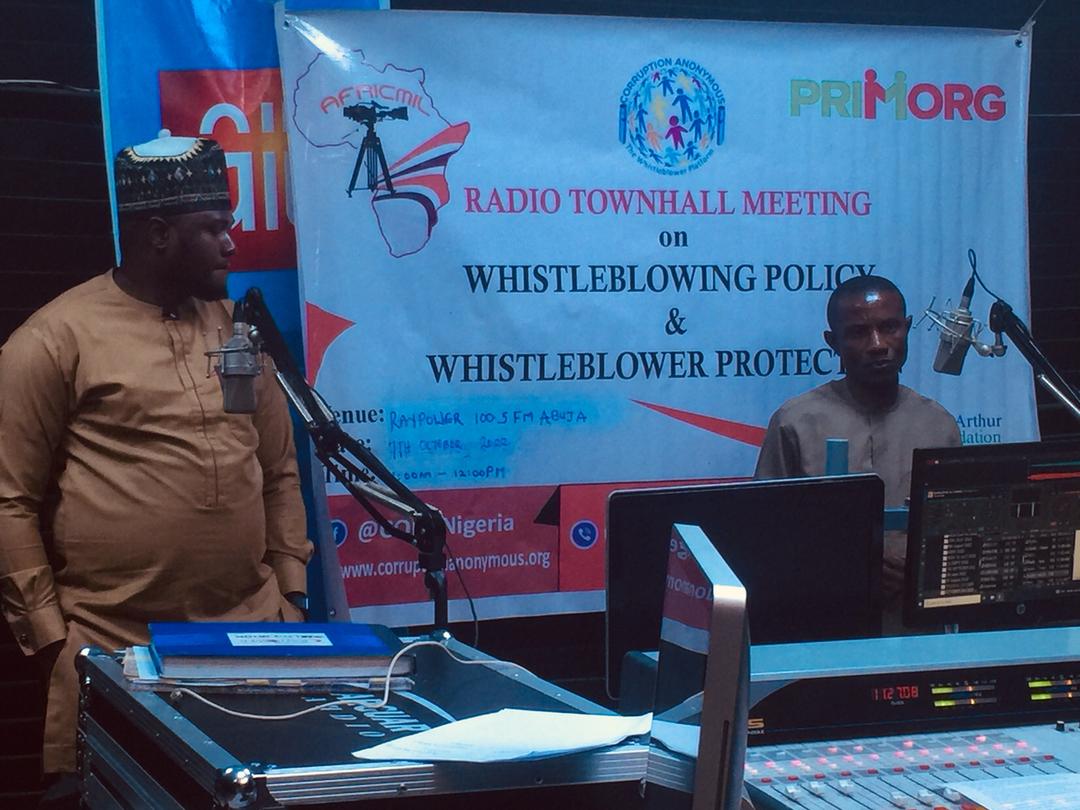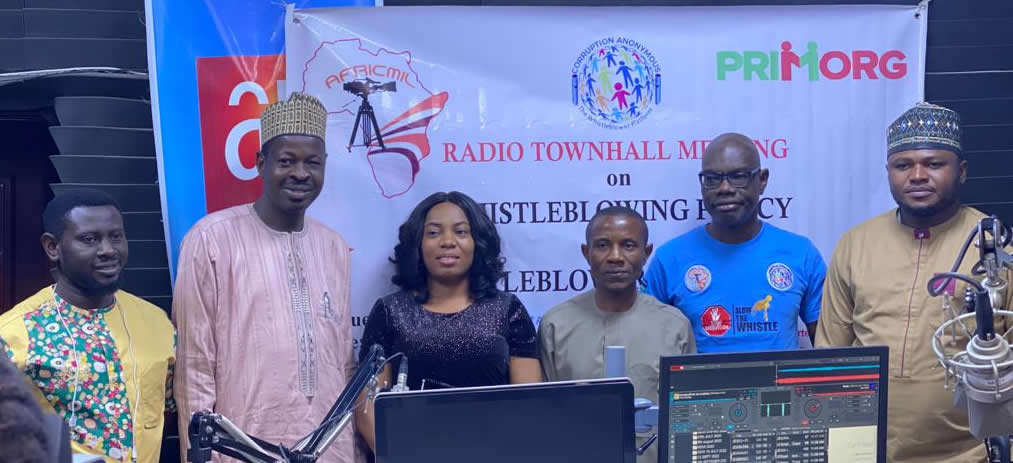Recall that as part of the effort to follow through with his sworn fight against corruption, President Buhari’s administration had, in December 2016, rolled out a whistleblowing policy, which continues to be fraught with issues to date due to the absence of legislative backing.
The fresh call for the Federal Government to legally secure whistleblowing in Nigeria was made during a town hall meeting organized by the African Centre for Media & Information Literacy (AFRICMIL) in collaboration with the Progressive Impact Organization for Community Development (PRIMORG) Friday in Abuja.

During the town hall meeting, AFRICMIL’s Programme Officer, Godwin Onyeacholem, called on President Buhari to leverage his rapport with the leadership of the National Assembly and ensure whistleblowing bills are harmonized, fast-tracked, passed, and signed into law before leaving office.
Onyeacholem expressed worry over the lackluster attitude of the government towards getting legislation that will strengthen whistleblower policy and adequately protect whistleblowers, stressing that “the non-passage of whistleblowing law from 2016 to date points to lack of political will”.
He called on the President to utilize his presidential powers and persuade lawmakers to enact the law. “if he’s (Buhari) interested in pushing whistleblowing out there as an effective anti-corruption mechanism, I think what he should do is to summon the leadership of the NASS and say, I want this bill before the end of my tenure. It is possible. It can be done,” Onyeacholem stressed.
Similarly, legal practitioner Godwin Chigbu stated that the possibility of enacting a whistleblowing law in Nigeria is very high, considering the excellent relationship between the Executives and most legislators.
Chigbu urged President Buhari to complete the good work he started when his administration introduced the policy nearly seven years ago. The “lack of political will to pass whistleblower bills into law is dangerous for the nation.”

On his part, Deputy Editor Daily Trust, Abdulaziz Abdulaziz, revealed that the lack of legislation for whistleblowing in Nigeria is affecting the Nigerian media from holding public officials to account.
He urged journalists not to relent in exposing corrupt acts in society despite the hostile environment they operate in.
“Whistleblowing is a civic duty. It’s a responsibility to us, especially in the media, we have that constitutionally assigned duty of holding public officials to account, which by all means necessary, we have to try and continue doing it,” Abdulaziz advised.
Strategic Communications Manager, Accountability Lab Nigeria, Suleiman Mukthar, counseled President Buhari to enact a whistleblowing law as one of his last legacies.
“Tenures are about legacies. The President has done his bit, passing the Electoral Act, which we are all proud of. This is also something else he can add to his own legacy,” Mukthar advised.
He warned that citizens will continue to shy away from reporting if there is no whistleblowing legislation on the ground while calling on civil society organizations and citizens to continue advocating for the enactment of a whistleblowing law before May 29, 2023.

The Radio Town Hall meeting Series is a collaborative effort between AFRICMIL and PRIMORG, aimed at increasing citizens’ active participation and involvement and encouraging the government to institutionalize the whistle-blowing policy.
The MacArthur Foundation supports the project.
About Author
You may also like
-
Anti-Corruption: Whistleblowing Law Long Overdue – Activists, Lawyers Counsel FG
-
N12bn Bribery Scandal: EFCC Urged To Prosecute Indicted Nigeria Customs Officials
-
NEIP: ICPC Harps On Collective Fight Against Corruption
-
ICPC Says Constituency Projects Tracking Declining Corruption, Urge Nigerians To Report Infractions
-
Birth Certificates: Corruption Unabated in Registration Centers — FG Alerted

